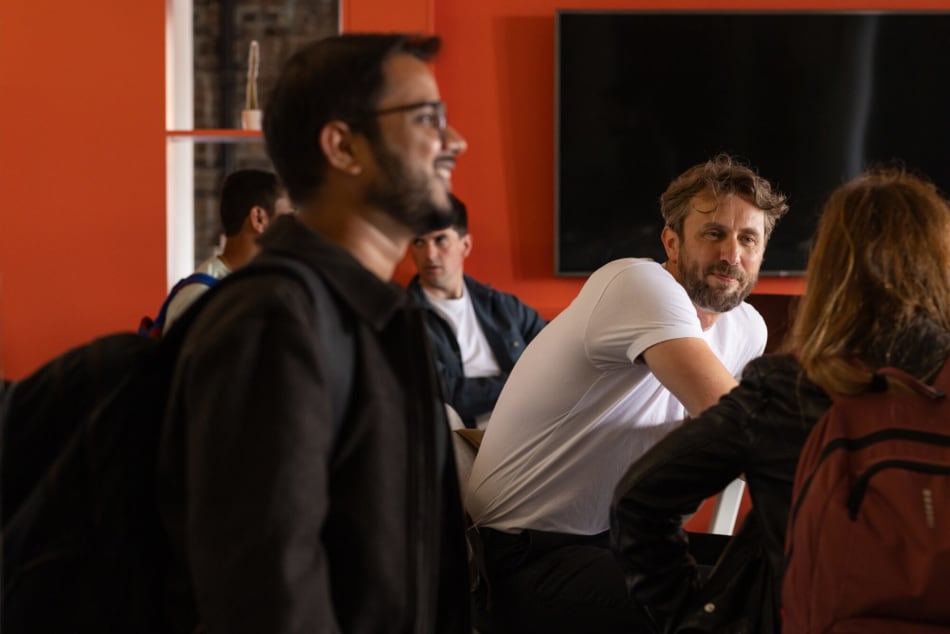
Key Insights




Right, let’s kick things off with a quote from founder, author and 2010’s digital marketing celebrity Rand Fishkin.
“In 2004, good SEO made you remarkable on the web. In 2014, good SEO is a result of being remarkable on the web.”
Now, I’m going to argue that the evolution of this idea is already clear, and that the next phase of this quote is going to be:
“Being good on the web in 2025 is about how you turn up in real life.”
The pace of change hasn’t slowed down in the 16 years that I’ve worked in digital marketing. It’s been a relentless juggernaut careering down the highway of attention. Change is ever-present, and adaptation isn’t just necessary – it’s crucial.
I’ve been thinking a lot about how generative AI is changing B2B Marketing for businesses like ours, and I’ve cemented the following four ideas in my head that I’d like to share with you today.
Buckle up.
—
1. People were only half paying attention before… now they aren’t at all
This feels counter-intuitive because people will point to the rising screen times, the number of devices, the sheer volume of content consumed for entertainment. But, listen to me… 90% of people who started reading this article have already given up.
Maybe it was that last sentence that broke the camel’s back!
Our attention is fractured, we are searching for signal in all the noise… and post November 2023, the noise has grown unbearably loud.
When it comes to digital marketing and advertising, you can buy ad inventory everywhere (Search, affiliates, social, video, display, audio et al), but you can’t make the people at on the receiving end pay attention to your work!
They skip podcast ads, they block display, they mute pre-roll and most importantly they are starting to ask ChatGPT or AI mode questions that would have once been long tail keywords. Marketing which is focused on dropping people on your landing pages, which was table stakes is now getting difficult to justify.
To hold someone’s attention with an opinion, you need to be in the room with them.
You need to see the whites of their eyes.

2. Brand has always been king, it is now grand imperial emperor
Being memorable online is hard (we can’t all be Irn Bru or Old Spice!).
Having a personality, a story and a differentiated style is nigh on impossible – especially if you are in an industry like ours – where every consultancy has a similar business model, but it has arguably never been more important.
In an age where D2C businesses are focusing on psychology and meaning-making as much as marketing, B2B has to tell its customers why they should care and imbue a sense of character.
D2C has leveraged the mico-influencer to tell their stories and vouch for their products, in B2B we need to get our most valuable asset, our clients, to speak on our behalf.
Our clients call us ‘indispensable’, which we love… but how did we become indispensable?
- We work with humility, personality and empathy – as productive collaborators
- We have principles, character and charm – we are lovely to work alongside
- We become part of our clients’ organisations – we build and maintain personal relationships
And where do we do all of this? In person, in our offices or our client’s offices working with their teams.
3. Old broadcast modes of communication may just make a recovery
As social media and video platforms fill up with GenAI slop, what might start to cut through is the stuff we divested from in the late teens (2015-2019).
This is a tough one to get people to agree with, but my hypothesis is that people would rather:
- Read a flyer than scan a QR
- Take home a magazine than download a PDF
- Go to an event than join a webinar
- Listen to the radio than deal with Spotify paralysis
- Watch on-demand ads, than pay for the ad free tier
I’m happy to be proved wrong, but I feel like especially well-off, gen Z & millennials, the people who B2B marketers are currently targeting, feel the same.
I want to continue to explore, test and prove this to be true but my gut already feels intuitively like I’m onto something here! Handing a copy of a book to someone at the end of an event feels so much more ‘real’ than buying the mid-roll in their favourite podcast.

4. Delineated marketing roles will consolidate – generalists will win big
At the start of my career, I was a digital marketing analyst. I have also looked after specific channels and their related budgets.
My prediction for B2B marketing jobs is that we won’t grow by delineating by expertise (and maybe this is an extension of digital roles in general. Maybe, software delivery becomes more cross-functional as the technical bar lowers due to AI) as we once did by having events, comms, ads, social, creative etc. We’ll have highly skilled generalists utilising AI toolkits to be ultra efficient.
The marketing managers of tomorrow better be good behind a camera and in front of it and understand Canva, Adobe, Google Ads, Optimizely, GA and the rest, because they will be orchestrating everything, rather than a small niche of activities.
How this relates to IRL? Generalists will work together on complex problem solving in office spaces, and we’ll do it with sincerity, empathy and respect.
It might not be every day, but in office collaboration is only going to increase.
We need to put down our devices and ‘touch grass’.
—
I hope you enjoyed this perspective piece. All the opinions expressed are my own, rather than those of Waracle.
For context, Waracle offer technology strategy and innovation consultancy and digital product development.
We build products that are used by millions of people across the UK, if you are designing or building a mobile, web or AI product and need a partner to collaborate with, we’d love to help.
Authors
Related

Article • 24 February 2026
Workplace pensions – the tech-enabled accumulation, retention and decumulation drivers

Article • 18 February 2026
Revisiting Lean Software’s 7+1 Wastes with GenAI and Continuous Delivery

Article • 10 February 2026
Waracle’s 2026 Strategy – Building the Benchmark for Modern Consultancy



